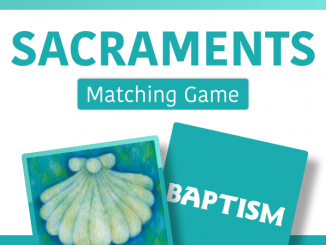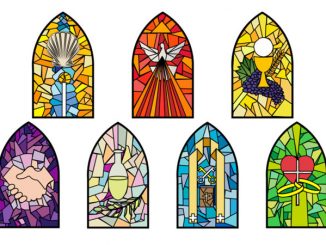Recently, we began a series here on my blog about the six tasks of catechesis, focusing on the notion that God is calling each of us to fulfill a role that he has planned for us. Just as actors rely on certain strategies to immerse themselves in character, we too rely on certain strategies to “immerse” ourselves in the role that God is calling us to fill: the “best version of ourselves” (to borrow a phrase from Matthew Kelly). We call these strategies the Six Tasks of Catechesis. Today, we look at task number 2: Promoting Knowledge of the Liturgy and the Sacraments by looking at how actors practice the skill of “memory of emotion.”
Memory of Emotion – Have you ever walked into a home and smelled a certain food cooking and immediately associated that with a memory from long ago and the feelings that accompanied that memory? The fact is, we have many feelings and emotions stored away in our unconscious. Actors need to learn how to draw on these memories of feelings and emotions – affective memories – in order to bring them into the present and make their character more authentic.

In his book, Acting: The First Six Lessons (Enhanced Edition, Echo Point Books & Media, 2013), Richard Boleslavsky tells a story to illustrate the power of memory of emotion. In it, a young man proposes to his love on a fine summer evening as the two were walking through a cucumber patch. They stopped occasionally to pick a cucumber and eat it, savoring the smell, the taste, and the freshness as well as the happy circumstances. At the wedding, a dish of fresh cucumbers was served but no one knew why the couple laughed so heartily when they saw it. Throughout the years, they experienced the struggles that any couple faces and occasionally quarreled. However, without fail, the quickest way for them to make peace was for one of them to put a dish of cucumbers on the table. The memory of the feelings of love and excitement that they experienced on that summer day 25 years ago came rushing into the present to transform the moment. This ability to draw from the past in order to transform the present was a skill that Boleslavsky insisted every actor needs.
Following Jesus as one of his disciples draws us into a community of believers who seek to be transformed in the present by drawing on their collective memory as the People of God. Just as that cucumber was able to wordlessly bring the newness of that couple’s love out of the past and into the present in order to transform and renew them, followers of Jesus partake in actions that make the suffering, death, and Resurrection of Jesus – events that occurred in history over 2000 years ago – present to us now so that we might be transformed by them. Words alone do not make the past present to us. The Mystery of Faith – the “story” within which we have a role to play – is a reality that is both experienced and expressed in more than words. Christian faith, in the Catholic tradition, is experienced and expressed, not only through the spoken words of a profession of faith, but also through the unspoken movements and gestures of sacramentality and, in particular, liturgy. Without these, the story of our faith would remain in the past and we would remain un-transformed.
 Strategy #2: Seek mystery – In order for the great story of Jesus Christ to penetrate, not only your head, but also your heart, you will need to experience the story through, not only words, but also the mysterious language of liturgy. Catholics learn how to more deeply enter into their role as disciples of Christ by entering into the mystery of the liturgy and the sacraments. I recommend that you experience liturgy – Sunday Mass – regularly, not just out of a sense of moral obligation but as an exercise in honing the role to into which the Divine Director has cast you. In doing so, you will come to recognize the pattern of your life within the context of the story of salvation history. Pay special attention to the signs, symbols, and non-verbal elements of the liturgy: water, fire, bread, wine, processing, signing, bowing, kneeling, and, most profoundly, receiving Christ himself in the great sign of the Eucharist. Become a student of the language of mystery and learn to recognize how God reveals his presence to us each and every day through the sacramentality of his amazing creation. Before long, you will recognize that you are not going through life like an actor wandering aimlessly on an unlit stage without a script, a role, or even a show to perform in but as a key player in the Greatest Story Ever Told – a story that continues to be made present through the lives of each unique disciple of Christ.
Strategy #2: Seek mystery – In order for the great story of Jesus Christ to penetrate, not only your head, but also your heart, you will need to experience the story through, not only words, but also the mysterious language of liturgy. Catholics learn how to more deeply enter into their role as disciples of Christ by entering into the mystery of the liturgy and the sacraments. I recommend that you experience liturgy – Sunday Mass – regularly, not just out of a sense of moral obligation but as an exercise in honing the role to into which the Divine Director has cast you. In doing so, you will come to recognize the pattern of your life within the context of the story of salvation history. Pay special attention to the signs, symbols, and non-verbal elements of the liturgy: water, fire, bread, wine, processing, signing, bowing, kneeling, and, most profoundly, receiving Christ himself in the great sign of the Eucharist. Become a student of the language of mystery and learn to recognize how God reveals his presence to us each and every day through the sacramentality of his amazing creation. Before long, you will recognize that you are not going through life like an actor wandering aimlessly on an unlit stage without a script, a role, or even a show to perform in but as a key player in the Greatest Story Ever Told – a story that continues to be made present through the lives of each unique disciple of Christ.
[photo courtesy of viZZZual.com via Compfight and Mike via Compfight]





Be the first to comment